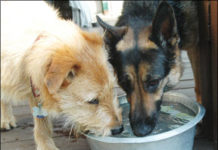Why is my dog peeing blood?
There are several conditions that can cause blood in your dog’s urine. Let’s look at the different causes and how each one is diagnosed and treated.
Urine Trouble
My 2-1/2 year old spayed female Akita is showing a pattern of recurring bladder infections. An ultrasound showed scar tissue from a long-term infection before I adopted her from a rescue group. When she gets an infection, there is blood in her urine and the pH is 9.0. I understand there is a chicken and egg argument about the high pH and infections. Is there anything that will help lower the pH of her urine and make her less prone to infection, or is the high pH more likely just a result of the infection?
An Update on “Low Uric Acid” Dalmatians
A few months ago, I wrote about the British Kennel Club’s registration of two special Dalmatians over the objections of the breed clubs there (Whole Dog Journal June 2010). These two dogs were the result of a breeding project begun in 1973, in which a single outcross to a Pointer was made in order to reintroduce the normal gene for uric acid back into the Dalmatian bloodline.
Preventing Bladder and Kidney Stones in Dogs
Bladder and kidney stones are serious problems in dogs as well as people. These conditions which are also known as uroliths or urinary calculi can be excruciatingly painful as well as potentially fatal. Fortunately, informed caregivers can do much to prevent the formation of stones and in some cases actually help treat stones that develop. Last month, we described struvite stones (see Canine Kidney Stone and Bladder Stone Prevention" Whole Dog Journal April 2010). Struvites contain magnesium
Is Frequent Urination in Dogs Normal?
If the symptoms your dog exhibits are straining to urinate, frequent, small accidents or repeated, small puddles when going outdoors, a likely cause is a lower urinary tract issue such as a bladder infection, bladder stones, or cystitis (bladder inflammation). Diagnostics will include a urine sample, urine culture, and possibly xrays of the bladder. Some breeds such as Schnauzers are more prone to certain lower urinary tract issues like bladder stones.
What Causes Bladder Stones in Dogs?
If your dog strains to urinate but nothing comes out or if he urinates and you see fresh blood, your dog may be suffering from bladder stones.
Case of the Missing Hormones
Incontinence in spayed females is fairly common. The problem is caused by a lack of estrogen, which, of course, was brought about by the spay surgery. Many people assume that when females are spayed, the veterinarian simply “ties the tubes,” that is, cuts and ties off the fallopian tubes so that the ovum can not travel from the ovaries, down the fallopian tubes, and become fertilized. Actually, the veterinarian removes the ovaries and usually, the uterus, too. The reason for this is that you not only want the female to become incapable of becoming pregnant, but also, you want her not to exhibit symptoms of heat.
Why Is My Female Dog Peeing On My Bed?
Any condition that alters a dog’s ability to completely empty her bladder can cause her to urinate while she sleeps. These conditions include urinary tract infections, bladder stones, tumors of the bladder or urethra, and congenital malformations of the bladder.
Canine Bladder Infections
If you've lived your life with dogs, chances are you've cared for one with a bladder infection. The normal urinary bladder is sterile, meaning devoid of bacteria. Infection occurs when bacteria find their way into the bladder and set up housekeeping. Bacterial cystitis (medical-speak for a bladder infection) is a common diagnosis in the canine world. The term urinary tract infection (UTI) is often used synonymously with bacterial cystitis. Technically speaking, a UTI can mean infection anywhere within the urinary tract, and is not specific to the bladder.
Potty Training Regression
Many rescue and shelter dogs are listed as potty trained. But, in fairness to the shelter, it can be difficult to ascertain whether a...
Involuntary Urination
When my dog Popcorn woke up one morning many years ago in a puddle of urine, I panicked, certain that only a deadly illness could cause this perfectly housetrained dog to wet her bed. I rushed her to the vet, where he did a thorough physical exam and urinalysis. I can still remember the relief I felt when my vet told me it appeared to be a simple case of incontinence. As it turns out, incontinence, which is defined as involuntary urination, is quite common in dogs, especially spayed females, where about one in five dogs (20 percent) is affected.
How long can a dog go without peeing?
Normal healthy dogs can hold their pee for four to eight hours. Puppies and senior dogs need to go more often, and high temperatures can cause the dog to drink more and need to go more often.



















